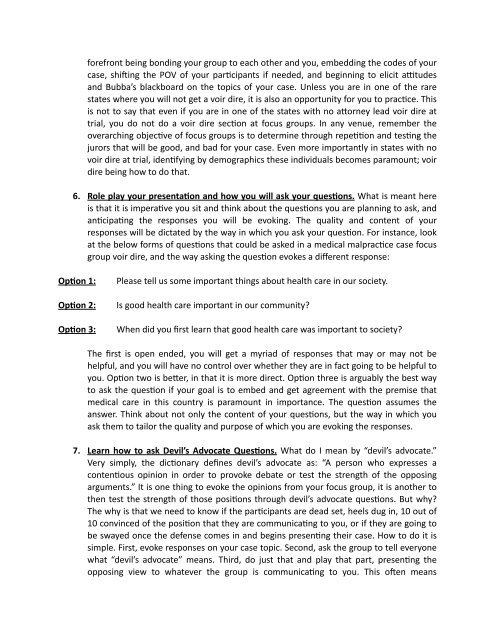FOCUS GROUPS BOOK
You also want an ePaper? Increase the reach of your titles
YUMPU automatically turns print PDFs into web optimized ePapers that Google loves.
forefront being bonding your group to each other and you, embedding the codes of your<br />
case, shiNing the POV of your parIcipants if needed, and beginning to elicit aZtudes<br />
and Bubba’s blackboard on the topics of your case. Unless you are in one of the rare<br />
states where you will not get a voir dire, it is also an opportunity for you to pracIce. This<br />
is not to say that even if you are in one of the states with no aPorney lead voir dire at<br />
trial, you do not do a voir dire secIon at focus groups. In any venue, remember the<br />
overarching objecIve of focus groups is to determine through repeIIon and tesIng the<br />
jurors that will be good, and bad for your case. Even more importantly in states with no<br />
voir dire at trial, idenIfying by demographics these individuals becomes paramount; voir<br />
dire being how to do that.<br />
6. Role play your presenta6on and how you will ask your ques6ons. What is meant here<br />
is that it is imperaIve you sit and think about the quesIons you are planning to ask, and<br />
anIcipaIng the responses you will be evoking. The quality and content of your<br />
responses will be dictated by the way in which you ask your quesIon. For instance, look<br />
at the below forms of quesIons that could be asked in a medical malpracIce case focus<br />
group voir dire, and the way asking the quesIon evokes a different response:<br />
Op6on 1:<br />
Op6on 2:<br />
Op6on 3:<br />
Please tell us some important things about health care in our society.<br />
Is good health care important in our community?<br />
When did you first learn that good health care was important to society?<br />
The first is open ended, you will get a myriad of responses that may or may not be<br />
helpful, and you will have no control over whether they are in fact going to be helpful to<br />
you. OpIon two is bePer, in that it is more direct. OpIon three is arguably the best way<br />
to ask the quesIon if your goal is to embed and get agreement with the premise that<br />
medical care in this country is paramount in importance. The quesIon assumes the<br />
answer. Think about not only the content of your quesIons, but the way in which you<br />
ask them to tailor the quality and purpose of which you are evoking the responses.<br />
7. Learn how to ask Devil’s Advocate Ques6ons. What do I mean by “devil’s advocate.”<br />
Very simply, the dicIonary defines devil’s advocate as: “A person who expresses a<br />
contenIous opinion in order to provoke debate or test the strength of the opposing<br />
arguments.” It is one thing to evoke the opinions from your focus group, it is another to<br />
then test the strength of those posiIons through devil’s advocate quesIons. But why?<br />
The why is that we need to know if the parIcipants are dead set, heels dug in, 10 out of<br />
10 convinced of the posiIon that they are communicaIng to you, or if they are going to<br />
be swayed once the defense comes in and begins presenIng their case. How to do it is<br />
simple. First, evoke responses on your case topic. Second, ask the group to tell everyone<br />
what “devil’s advocate” means. Third, do just that and play that part, presenIng the<br />
opposing view to whatever the group is communicaIng to you. This oNen means






